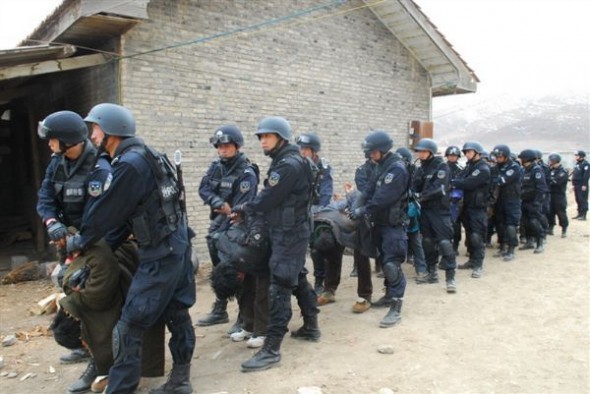Legalizing the Tools of Repression



Are China’s police hamstrung by a lack of power to detain national-security suspects?
What looks like an odd question to outsiders, given the notoriously elastic scope of what constitutes national security under China’s one-party system, has actually been the focus of one of the most intense behind-the-scenes political battles ahead of the leadership transition next October from President Hu Jintao to his likely successor, Xi Jinping.
The focus of the battle is a long-in-the-works set of revisions to the Criminal Procedure Law, which is expected to be adopted next month at the last annual plenary session of the National People’s Congress under Hu.
The more progressive-minded factions of the Communist Party and the government consider legal reforms to be integral to China’s modernization. They see enlightened self-interest in giving a greater role to the rule of law, and reforming the criminal code to offer due-process rights that resemble international norms is a key part of this effort.
The other camp is made up of the powerful security apparatus and the more conservative and hard-line elements in the party and the government. This faction has become increasingly powerful since it was assigned the leading role for the security of the 2008 Beijing Olympics.
To this group, the law is purely instrumental — a tool of state power — and should not be altered to empower the citizenry and curtail the authority of the party. The hard-liners believe it is critical to allow security services to deal expediently with threats to the broadest possible interpretation of national security and public order, even if that means frequent miscarriages of justice.
Both camps have made their mark on the draft of the new criminal-procedure law.
Reformers have included provisions requiring prompt access to a lawyer and protection against coerced confessions. Procedures would be stronger for hearing death penalty cases, cross-examining witnesses and excluding evidence obtained by torture. Juveniles and mentally ill defendants will receive additional protections. If implemented — admittedly a big if — this would constitute significant progress.
But the security apparatus has also gotten its way. Under the guise of regulating “residential surveillance,” Article 73 of the revised law would effectively legalize secret detentions and “disappearances” of people viewed as political risks by the government. This would legalize a pernicious practice that has recently been used against the artist Ai Weiwei, the lawyer Gao Zhisheng and the Nobel Peace Prize laureate Liu Xiaobo. Up to now, such abductions have been technically illegal.

Article 73 would allow the police to secretly detain citizens for up to six months on suspicion of “endangering state security” or “terrorism” — two vague charges that have long been manipulated by the government to crack down on dissidents, human-rights lawyers, civil-society activists and Tibetan and Uighur separatists.
Even more chilling, these secret detentions would be carried out in venues controlled by the police outside of regular detention facilities, greatly increasing the likelihood of ill-treatment. Gao Zhisheng, for example, was tortured while in such detention.
When the draft legislation was first published for public consultation last summer an unusual firestorm of protest erupted in the domestic media, on the Internet and in legal circles. The Chinese human rights community, in particular, unanimously expressed alarm at what Hu Jia — one of China’s best-known activists and a veteran of “residential surveillance” — termed the “KGB clause.”
Why is China’s leadership considering giving more powers to the security services, when it means bringing into disrepute what otherwise could have be an important legal reform?
One reason is that on any given day, 200 to 300 protests take place across China. The scale of the protests varies from less than a dozen people to tens of thousands. The protests are fueled by a host of labor, environmental and livelihood issues, compounded by corruption and abuses of power, primarily among local officials. Unable to take their grievances to the courts, a growing number of people are taking them to the streets. Often, only the police stand between “the masses” and the party.
Second, the leadership is increasingly concerned that it is losing the battle against the spread of “global values” among the citizenry — code in China for human rights, the rule of law and freedom of expression. Hard-liners believe they need the power to take dissidents and critics “off the grid,” both to silence them and to make an example of them to others. Legalizing “disappearances” provides just the tool.
Whether Xi Jinping and the new leadership will be more inclined than Hu to address public concerns and engage in reforms remains anyone’s guess. But if the security services solidify their power further, they may pose a greater challenge to reform down the line.
The rise of the national security faction is one of the most foreboding trends in China. Whether Article 73 is adopted or not will signal a great deal about whether China is making progress toward the rule of law or solidifying the supremacy of the security state.
Nicholas Bequelin is senior researcher on Asia at Human Rights Watch.
No comments:
Post a Comment
Comments always welcome!